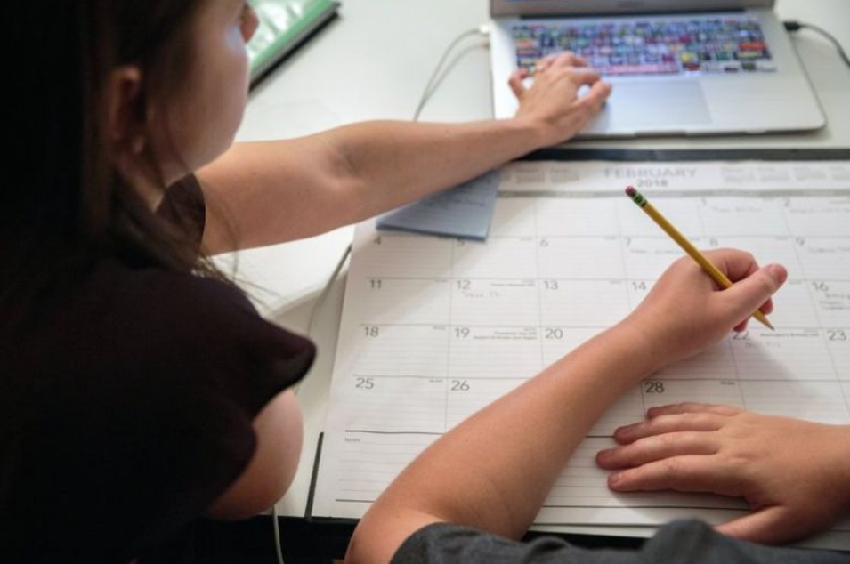Homework therapists' job: Help solve math problems, and emotional ones

Leah Kesselman (left) is a clinical psychologist and one of dozensof New York coaches who work for Beyond BookSmart.
NEW YORK (NYTimes) - On a recent Sunday, Bari Hillman, who worksduring the week as a clinical psychologist at a New York mentalhealth clinic, was perched at a clear, plastic desk inside a16-year-old's Manhattan bedroom, her shoeless feet resting on afluffy white rug. Hillman was helping a private school sophomoremanage her outsize worry over a long-term writing project. Thestudent had taped the project outline on the wall above the desk,at Hillman's prodding. It was designed to serve both as a reminderthat the project was due, and an empowering indicator ofprogress.
Hillman mused about the way worry can morph into unhealthyavoidance, the cathartic power of deep breathing and the soothingnature of to-do lists.
Hillman, 30, represents a new niche in the US$100 billiontutoring industry. Neither a traditional tutor nor a straight-uptherapist, she is an amalgam of the two. "Homework therapists", asthey are now sometimes called, administer academic help andemotional support as needed. Via Skype, email and text, and duringpricey one-on-one sessions, they soothe cranky students, hoping tosteer them back to the path of achievement.
The service is not cheap. Parents in New York generally paybetween US$200 and US$600 for regularly scheduled in-personsessions that range from 50 to 75 minutes. This on top of the heftyfees New York mothers and fathers already pay to help theirchildren get ahead, or just stay on pace, from coaching forkindergarten gifted and talented tests, to subject tutoring, SATprep and help with writing their college essays.
Tutors make themselves available for last-minute interventionsbefore midterms or when writing projects are due. They respond totexts and emails and often send their own, nudging students tofinish a homework assignment or stay positive before and during abig exam.
Some have teenagers create playlists on Spotify that expresstheir feelings about homework. Others hand out blobs of scentedputty, known as therapy dough, that is designed to calm. Others usemeditation and mindfulness to refocus their charges on the hunt fora 4.0 and higher SAT scores.
Homework therapists often have day jobs as clinicians athospitals, family counselling centres or their own privatepractices. Evenings they work with overwhelmed students to createstudy guides, do algebra problems, organise binders, smooth outcrumpled papers at the bottom of book bags and do "error analyses"when a biology test goes awry. But they also help children addressthe psychological issues that are holding them back, using commoncounselling techniques like motivational interviewing and exposuretherapy, a strategy sometimes used with victims of post-traumaticstress disorder.
Ariel Kornblum, a psychologist for children and adolescents,works out of her ground-floor office at the Manhattan PsychologyGroup's Upper West Side location. When she is not administeringregular therapy, she is often advising middle and high schoolstudents whose inability to organise their schoolwork, she says, ishurting their grades, and their self-esteem. She helps them developsorting strategies, workable planners and study schedules whilealso challenging some of the negative thoughts swimming around intheir heads.
"A lot of my clients will say: 'I did my homework. I forgot tohand it in a number of times. My grades are suffering. And now Ifeel badly about myself,'" she said. "What we do is get at the coreof why."
There is no official count of how many New York City tutors dothis hybrid work. But tutoring centres say demand is on therise.
The Brooklyn Learning Centre launched its Homework Therapyprogramme in 2001 with one therapist-tutor in its Brooklyn Heightsoffice. It has since opened centres in Park Slope and TriBeCa andenlists 12 homework therapists, 10 of them full time.
Anna Levy-Warren, a New York-based psychotherapist who openedher one-person practice in 2005, now has more than 50 tutors withmental health-related degrees who fan out across the city onweeknights and weekends. They also conduct sessions via Skype.
And 10 years ago, Inspirica, a high-priced, New York City-basedtutoring company that specialises in one-on-one test preparation,had no tutors with social work or psychology-related degrees. Thefounder and chief executive, Lisa Jacobson, says there are noweight in her New York office.
"Now, it's all about calming people down," she said.
The focus on students' emotional health is part of a largermovement in education. Today, most educators are trained insocial-emotional development, and advancements in brain imaging areincreasingly indicating how closely cognition and emotions arelinked.
Work by the Stanford University psychology professor Carol Dweckon "growth mindset" - the importance of believing that you canlearn and change - and the University of Pennsylvania's AngelaDuckworth on grit, or the ability to overcome setbacks, haveconvinced parents and educators that they can increase children'smotivation and goal setting with the right techniques.
Further, school administrators say there has been a notableuptick in the number of students who arrive each year withneuropsychological evaluations, a costly but extensive set oftests, often used to determine why a student is struggling toperform. The results include information about learningdisabilities, like attention deficit disorder and dyslexia, butalso a student's emotional state.
Ellen B. Braaten, associate director of The Clay Centre forYoung and Healthy Minds in Boston, says the arrival of this newbreed of clinician/coaches is not unique to New York, but is alsofinding a footing in areas around Boston, Philadelphia, Los Angelesand Northern California, where pressure on students to succeed ishigh and "therapy isn't stigmatised".
The homework therapists can put up with a lot of drama.
Leah Kesselman, a 28-year-old psychologist who works with BeyondBookSmart, a Boston-based firm with dozens of coaches in the NewYork area, says she has dealt with students who have repeatedlyyelled at her, "Get out," or "We don't need you." To calm themdown, she sometimes suggests a few minutes of video gaming or theSpotify playlists.
Levy-Warren, the New York psychotherapist, says she worked witha student who once sobbed to her after learning she had received aB on a paper. To help, she used "reframing", a popular cognitivebehavioral therapy technique, getting at what a B symbolised to herand helping her develop a more positive outlook.
Mellora Ansbro, a recent graduate of Johns Hopkins University,began working with Levy-Warren when she was a junior at RiverdaleCountry School, a private school in the Bronx. During meetings thatsometimes began at 9pm, Levy-Warren taught her how to write anessay and take better notes, and also how to navigate the highschool social scene and manage her parents. Six years later,shortly after graduating from college and anxious about her life,Ansbro, now 24, hired Levy-Warren again.
"I was freaking out," she said. "It was a big transition. And Ifelt underprepared." Over the last year and a half, Levy-Warren hashelped her come up with a study plan for the GRE, apply to graduateschool and ward off worries about what she should and should not bedoing with her life. She has also boosted Ansbro's spirits whenoccasional bouts of worry and depression have set in.
But Braaten at The Clay Centre notes that there are no licensingrequirements for homework therapists, so guidelines as to whatservices they actually provide can be murky and uniform standardsare nonexistent. Some build glitter globes with their students toserve as relaxing tools. Others use aromatherapy oils, andencourage students to create flash cards with affirmingmotivational mantras like "I got this," or "Done is better thanperfect." Further, Braaten says there is no strong evidence thatthis type of hybrid treatment actually works.
Holly Schiffrin, a professor of psychological science at theUniversity of Mary Washington in Fredericksburg, Virginia, whoresearches adolescent development and depression, says she thinks atutor who helps a struggling student with study skills andconfidence makes sense.
"But there should be a plan in place for them to become fullyfunctioning, independent adults," she said.












